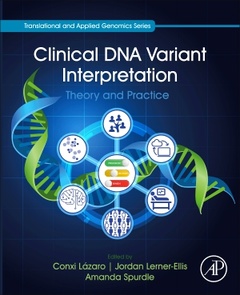Clinical DNA Variant Interpretation Theory and Practice Translational and Applied Genomics Series
Coordonnateurs : Lázaro Conxi, Lerner-Ellis Jordan, Spurdle Amanda
Directeur de Collection : Patrinos George P.

1. Introduction: The challenge of genomic DNA interpretation
Section I. Theoretical Chapters 2. General considerations: Terminology and standards 3. International consensus guidelines for constitutional sequence variant interpretation 4. Quantitative modelling: Multifactorial integration of data 5. Clinical and genetic evidence and population evidence 6. The computational approach to variant interpretation: principles, results, and applicability 7. Functional evidence (I) transcripts and RNA splicing outline 8. Functional evidence (II) protein and enzyme function 9. Somatic data usage for classification of germline variants 10. Pharmacogenomics and personalized medicine 11. Data sharing and gene variant databases 12. Approaches to the comprehensive interpretation of genome-scale sequencing 13. Phenotype evaluation and clinical context: Application of case-level data in genomic variant interpretation
Section II. Practical Chapters 14. Inherited cardiomyopathies 15. Phenylketonuria 16. Hearing loss 17. Familial hypercholesterolemia 18. Classification of genetic variants in hereditary cancer genes 19. RASopathies 20. Summary and conclusions
Dr. Jordan Lerner-Ellis has 20 years of experience in molecular genetics and diagnostics. He is Director & Head of Advanced Molecular Diagnostics in the department of Pathology and Laboratory Medicine at Toronto’s Mount Sinai Hospital, Sinai Health System; Associate Professor at the University of Toronto, Laboratory Medicine & Pathobiology; and Clinician Scientist at the Lunenfeld-Tanenbaum Research Institute. His laboratory provides clinical diagnostic services for hereditary breast, ovarian and colon cancer, and other genetic testing areas, for Toronto and the province of Ontario. Dr Lerner-Ellis completed his PhD in human genetics at McGill
- Compiles best practices, methods and sound evidence for DNA variant classification in one applied volume
- Features chapter contributions from international leaders in the field
- Includes practical examples of variant classification for common and rare disorders, and across clinical phenotypes
Date de parution : 03-2021
Ouvrage de 436 p.
19x23.3 cm
Mots-clés :
ACMG/AMP; Adverse drug reactions; Bayesian framework; Bioinformatics; ClinGen; Clinical genetics; Clinical practice; Database; Diagnosis; Disease genes; DNA variants; Drug efficacy; Exome sequencing; Functional assays; Genetic factors; Genetic testing; Genetic variants; Genetic variation; Genome sequencing; Genomic medicine; Genomics; Germ line; Guidelines; Hereditary cancer; Hereditary hearing loss; Hot spots; Integration; Loss-of-function; Molecular diagnosis; Molecular karyotyping; Multifactorial likelihood analysis; Mutation; Next-generation sequencing; NGS; Pathogenicity predictors; Personalized medicine; Pharmacogenes; Pharmacogenetics; Pharmacogenomics; Precision medicine; Predictive markers; Protein activity; Protein biophysics; Protein sequence variants; Protein stability and interactions; Quantitative model; Quantitative; Sequence conservation; Sharing; Signature; Somatic; Splicing variants; Submission; Variant classification; Variant consequences; Variant interpretation; Variant nomenclature; Variant; Variants of uncertain clinical significance; Variants of uncertain significance (VUS)


